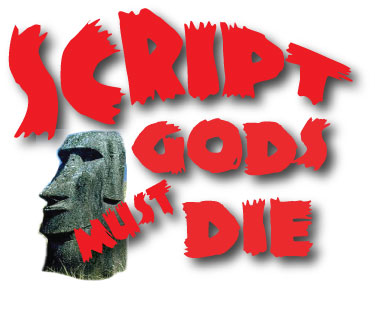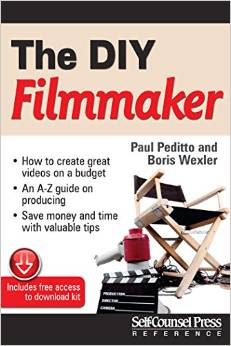“… and God help you if you use voiceover in your work, my friends. God help you! It’s flaccid, sloppy writing. Any idiot can write voice-over narration to explain the thoughts of a character. You must present the internal conflicts of your character in action.”
This speech by the Robert McKee character in Adaptation is one of the funniest scenes ever about that heavily-debated topic in screenwriting: Voice Over! The very sound of it (along with its sister-device flashback) strikes fear! Horror stories of those foolish writers/directors who used voice over, and whose careers were never to be seen again!
Film is a visual medium. Too often we’re waiting for the narrator’s voice to end or start the scene. Or we’re listening to the narrator describe what we’re plainly seeing. Is there a tried and true test for the need of Voice Over? Not really. Common sense will have to do: Is there no visual way through action for you to introduce absolutely essential information that advances plot or character? No? Well then, it’s in. If it has to be Voice Over, then it’s Voice Over. And that’s ok!
Like with everything else in the screenwriting universe, there are no absolutes. I’ll bet you can name half a dozen movies that use voice over to devastating effect. Want a couple examples? Here’s one, from Forrest Gump:
EXT. RURAL ALABAMA
A black and white photo of General Nathan Bedford Forrest.
The photo turns into live action as the General dons a hooded sheet over his head.
The General is in full Ku Klux Klan garb, including his horse.
The General rides off, followed by a large group of Klan members dressed in full uniform.
FORREST (V.O.)
She said we was related to him in some way. And, what he did was, he started up this club called the Ku Klux Klan. They’d all dress up in their robes and their bed sheets and act like a bunch of ghosts or spooks or something. They’d even put bed sheets on their horses and ride around. And anyway, that’s how I got my name. Forrest Gump.
Signature voice. You can’t imagine the movie without it. In fact, the movie couldn’t function without it. Read the script. There is no way the same story could be told without it, which is the measure of the need of V.O. There are many haters of Voice Over. I am not one of them. Here’s another example, from V For Vendetta:
In the darkness, we hear a voice, a woman’s voice. Her name is Evey.
EVEY (V.O.)
“Remember, remember, the fifth of November, the gunpowder treason and plot. I know of now reason why the gunpowder treason should ever be forgot.”
Her voice has a strength that is metered by a calmness, a deep centered peace that we can feel.
EVEY (V.O.)
Those were almost the very first words he spoke to me and, in a way, that is where this story began, four hundred years ago, in a cellar beneath the Houses of Parliament.
In the darkness, we find a lantern. Guy Fawkes, a dangerous man who wears a goatee, is struggling with a wheelbarrow stacked with barrels of gunpowder.
EVEY (V.O.)
In 1605, Guy Fawkes attempted to blow up the Houses of Parliament.
The wheelbarrow bumps over the heavy stone mortar of the cellar floor. From the dark depths, we hear the sound of dogs.
EVEY (V.O.)
He was caught in the cellars with enough gunpowder to level most of London.
Guy sees lanterns coming from both sides. He tries to run as the dogs reach him first. He grabs for his sword as dozens of pole axes pin him against the tunnel’s stone wall.
Concerning Voice Overs, the Script Gods Must Die rule applies: No other visual way through action for you to introduce absolutely essential information that advances plot or character? No? Then, damn the torpedoes and use Voice Over!


I was thinking about this too recently. Alot of acclaimed movies are heavily told with voice over. Just glancing over the top 50 on IMDB quickly: Amelie, City of God, Goodfellas, Sunset Blvd., Usual Suspects, Shawshenk Redemption, Citizen Kane, Forest Gump, American Beauty, A Clockwork Orange, To Kill A Mockingbird, and more.
So frankly I don’t get why people are so adamant about not doing voice over since people clearly go for it again and again. I mean in Goodfellas he talks directly to the camera. I didn’t really go for it but can’t say that loads of critics didn’t.
I don’t believe in absolutes in respect to movies. The number of classic Voice Over movies might easily
number in the hundreds. Your list is very good and only scratches the surface. It’s only when the Voice
Over stops the narrative flow or comments on things we can see, there is the issue for me. I remember
watching LITTLE CHILDREN, the V.O. describing Kate Winslet and child: “She would often go the park.”
And there was Kate in the park. Then the V.O. would follow: “She liked to swing her child on the swings.”
And there again is Kate swinging her kid. Just an oppressive V.O adding zero. As I recall I walked out on
LITTLE CHILDREN because of the V.O., and walked in to another theater to catch PAUL BLART, MALL COP!
I can’t figure out how t format someone describing someone. and showing that person the screen while the person is describing them.
Describing someone in voice over while we see them on the screen? Why would that be different than any other voice over?
EXT. COLUMBIA COLLEGE- DAY
Professor Pauly strolls through the entrance. OVER:
PROFESSOR PAULY (V.O.)
I would often arrives early for classes. God knows why…
[…] http://www.scriptgodsmustdie.com/2010/03/format-9-voice-over/ […]
If I’m showing a character perfoming an action like searching for something on the computer and I want to have a VO of her letting us know why she’s doing this do I put the general action first and then below write the VO or is it the other way around?
General example:
Claire gets up and goes to her computer and searches for ponies.
CLAIRE (V.O)
I knew I needed to search for ponies. This was the only way to find them.
Thanks!!
Exactly right. Action line, then dialogue with voice over.
[…] http://www.scriptgodsmustdie.com/2010/03/format-9-voice-over/ […]